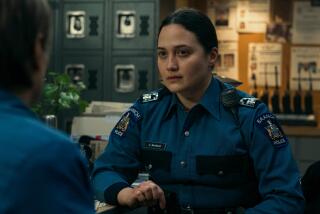Review: Mystery and conflict fill ‘Top of the Lake: China Girl’
Jane Campion has delivered a sequel to her 2013 miniseries “Top of the Lake,” which starred Elisabeth Moss as Robin Griffin, a Sydney, Australia, police detective who, during a trip home to a remote New Zealand town, investigates the case of a missing girl.
In “Top of the Lake: China Girl,” which begins Sunday on Sundance Channel, Griffin has just returned to Sydney after four years away, at once a seasoned, even legendary officer and the new face on the force. “I’m happy,” she tells Ray (Geoff Morrell), the forensic pathologist who is her sole friend and confidant. But she’s having dreams and screaming in her sleep.
“Where’s your loved one?” he asks her.
She is in Sydney. A girl Griffin gave up for adoption at birth is about to turn 18 – that Griffin was raped as a teenager was revealed in the first series – and she is thinking about finding her. (The girl, Mary, is played by Alice Englert, Campion’s daughter and the star of the 2013 feature “Beautiful Creatures.”)
Griffin leaves a note at the home of the girl’s adoptive parents, Pyke (Ewen Leslie) and Julia (Nicole Kidman, in a gray wig and de-glamorized just to the point where one imagines, “This might be what Nicole Kidman looks like in the morning”). They will welcome her in different ways.
Like its predecessor, “China Girl” begins with a young girl going into a body of water – an ocean now, not a lake, and this time the girl is a body in a suitcase. Both series are very much concerned with parents and children and what else might constitute a family, for good or for ill. There are charismatic men no less dangerous to women for seeming to respect them. As before, the end will be something other than what the beginning suggests.
Working again with co-writer Gerard Lee and with new co-director Ariel Kleiman, Campion wastes no time in getting her major players onstage, introducing them in their various, soon-to-collide worlds. When that body-bearing suitcase is dropped into the sea, we know who did the drop and who is acquainted with its contents. How the body got into the suitcase and why are questions that will linger through the six-episode series.
In the usual way of these things, Griffin is assigned a new partner, Miranda Hilmarson, played by 6-foot-3 Gwendoline Christie (“Game of Thrones”), who is as squishy and expressive as Griffin is controlled and contained. There is some comedy in their differences, and some drama. The solution to the mystery – the one with which the procedural is concerned – is secondary to the human mysteries unfolding. Even scenes in which Griffin and Hilmarson actively investigate the case will be more about their own relationship than that aboutcharacters who fall in their way.
Much of the action is set around a brothel – legal in parts of Australia – above which lives Alexander, also called “Puss” (David Dencik), a half-principled, nine-tenths cynical, unkempt ex-”junior professor” who gives casual instruction in English and social dynamics to the prostitutes below. “No one ever gives away power,” he has them say. “Power has to be taken.” (When they ask for something more useful to their work, he offers “Wow.”) That he is German makes him seem a bit of a caricature, but Dencik and Campion make it hard to pin him down completely.
Moss is alive in every moment, incandescent even at (restless) rest; she’s the fuel “Lake” burns for energy. As on “Mad Men” and “The Handmaid’s Tale,” she’s fearsome and fractured and catnip to men, through no design of her own. But if her bones are steel, her flesh is only flesh, and overwhelmingly this is a story about fallible, reliable human hearts. What counts is how Griffin gets on with Hilmarson and with her daughter. Everything else, no matter how much story time it gets – the professor in the attic, the girls in the brothel, the millennial Girl Haters Club that meets to rate prostitutes and discuss seduction techniques, Mary’s adoptive parents, even the work Griffin repeatedly refers to as important to her — matters only in how it affects those three relationships.
It is not a perfect construction. Some points feel too explicitly made — men are trouble — and some situations absurd. The story occasionally seems to skip a beat. It is a little too generous, perhaps, with coincidence. The climactic set piece, in a summer crowd on Bondi Beach, is superbly mounted and suspenseful but makes no real-world sense.
Still, perfection isn’t really the point. Campion has created a world – not as primal and mysterious as in the original series, but with its own exotic integrity – with characters alive enough to care for. (Alive enough that you would prefer they think a minute and make the smart decision, even at the price of writing the series out of existence. Mostly they won’t, fortunately, but sometimes they will — also fortunately.) Once you’re in it, you’re in for the duration.
‘Top of the Lake: China Girl’
Where: Sundance
When: 9 p.m. Sunday, Monday and Tuesday
Follow Robert Lloyd on Twitter @LATimesTVLloyd
Review: Jane Campion’s ‘Top of the Lake’ mysterious, beautiful
Jane Campion followed ‘Bright Star’ with a move to TV and ‘Top of the Lake’
More to Read
The complete guide to home viewing
Get Screen Gab for everything about the TV shows and streaming movies everyone’s talking about.
You may occasionally receive promotional content from the Los Angeles Times.







